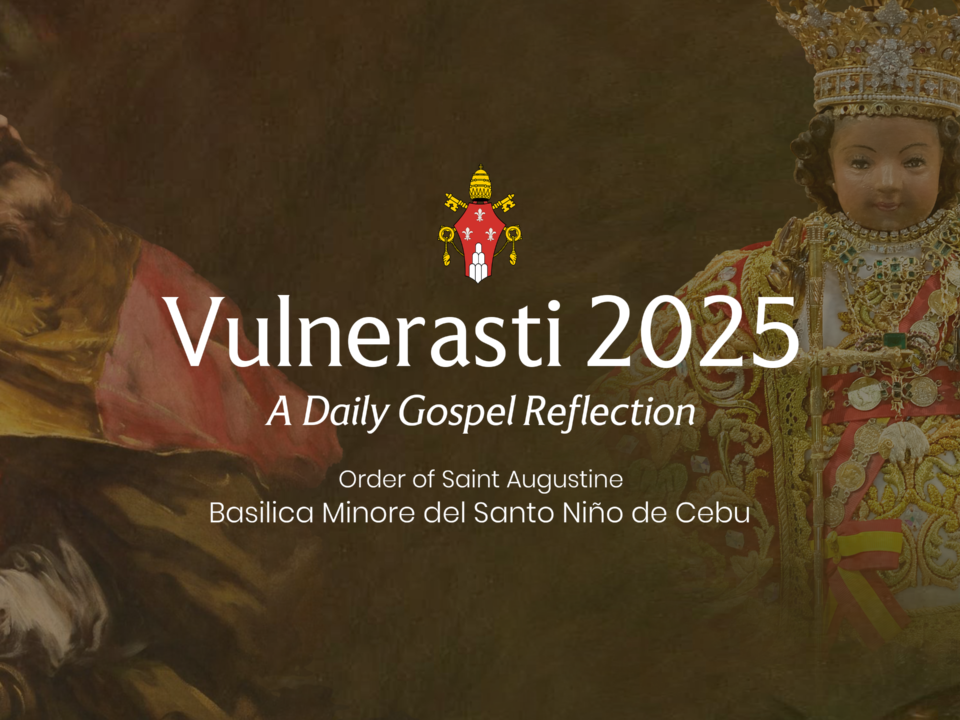November 18, 2025
November 18, 2025
Jesus entered Jericho and was passing through it. A man named Zaccheus lived there. He was a tax collector and a wealthy man. He wanted to see what Jesus was like, but he was a short man and could not see him because of the crowd. So he ran ahead and climbed up a sycamore tree. From there he would be able to see Jesus, who was going to pass that way. When Jesus came to the place, he looked up and said to him, “Zaccheus, come down quickly, for I must stay at your house today.” So Zaccheus climbed down and received him joyfully.
All the people who saw it began to grumble, and said, “He has gone as a guest to the house of a sinner.” But Zaccheus spoke to Jesus, “Half of what I own, Lord, I will give to the poor, and if I have cheated anyone, I will pay him back four times as much.” Looking at him Jesus said, “Salvation has come to this house today, for he is also a true son of Abraham. The Son of Man has come to seek and to save the lost.”
November 17, 2025
November 17, 2025
When Jesus drew near to Jericho, a blind man was sitting by the road, begging. As he heard the crowd passing by, he inquired what was happening, and they told him that Jesus of Nazareth was going by. Then he cried out, “Jesus, Son of David, have mercy on me!” The people in front of him scolded him.“Be quiet!” they said, but he cried out all the more, “Jesus, Son of David, have mercy on me!”
Jesus stopped, and ordered the blind man to be brought to him; and when he came near, Jesus asked him, “What do you want me to do for you?” And the man said, “Lord, that I may see!” Jesus said, “Receive your sight, your faith has saved you.” At once the blind man was able to see, and he followed Jesus, giving praise to God. And all the people who were there also praised God.
November 14, 2025
November 14, 2025
As it was in the days of Noah, so will it be on the day the Son of Man comes. In those days’ people ate and drank and got married; but on the day Noah entered the ark, the flood came and destroyed them all. So it was in the days of Lot: people ate and drank, and bought and sold, and planted and built; but on the day Lot left Sodom, God made fire and sulfur rain down from heaven, which destroyed them all. So will it be on the day the Son of Man is revealed.
On that day, if you are on the rooftop, don’t go down into the house to get your belongings; and if you happen to be in the fields, do not turn back. Remember Lot’s wife! Whoever tries to save his life will lose it, but whoever gives his life will be born again.
November 13, 2025
November 13, 2025
The Pharisees asked Jesus when the kingdom of God was to come. He answered, “The kingdom of God is not like something you can observe, and say of it, ‘Look, here it is!’ or ‘See, there it is!’ for the kingdom of God is within you.”
And Jesus said to his disciples, “The time is at hand, when you will long to see one of the glorious days of the Son of Man, but you will not see it. Then people will tell you, ‘Look there! Look here!’ Do not go with them, do not follow them. As lightning flashes from one end of the sky to the other, so will it be with the Son of Man; but first he must suffer many things, and be rejected by this generation.
November 12, 2025
November 12, 2025
On the way to Jerusalem, Jesus passed through Samaria and Galilee, and as he entered a village, ten lepers came to meet him. Keeping their distance, they called to him, “Jesus, Master, have pity on us!” Jesus said to them, “Go, and show yourselves to the priests.” Then, as they went on their way, they found they were cured. One of them, as soon as he saw that he was cleansed, turned back, praising God in a loud voice; and throwing himself on his face before Jesus, he gave him thanks. This man was a Samaritan.
Then Jesus asked him, “Were not all ten healed? Where are the other nine? Did none of them decide to return and give praise to God, but this foreigner?” And Jesus said to him, “Stand up and go your way; your faith has saved you.”
November 11, 2025
November 11, 2025
Who among you would say to your servant, coming in from the fields after plowing or tending sheep, ‘Go ahead and have your dinner’? No, you tell him, ‘Prepare my dinner. Put on your apron, and wait on me while I eat and drink. You can eat and drink afterward.’ Do you thank this servant for doing what you told him to do? I don’t think so. And therefore, when you have done all that you have been told to do, you should say, ‘We are no more than servants; we have only done our duty.’”
November 10, 2025
November 10, 2025
Jesus said to his disciples, “Scandals will necessarily come and cause people to fall; but woe to the one who brings them about. It would be better for him to be thrown into the sea with a millstone around his neck. Truly, this would be better for that person, than to cause one of these little ones to fall.
Listen carefully: if your brother offends you, tell him, and if he is sorry, forgive him. And if he offends you seven times in one day, but seven times he says to you, ‘I’m sorry,’ forgive him.”
The apostles said to the Lord, “Increase our faith.” And the Lord said, “If you have faith, even the size of a mustard seed, you may say to this tree, ‘Be uprooted, and plant yourself in the sea!’ and it will obey you.
His disciples recalled the words of Scripture: Zeal for your house devours me like fire.
The Jews then questioned Jesus, “Where are the miraculous signs which give you the right to do this?” And Jesus said, “Destroy this temple and in three days I will raise it up.” The Jews then replied, “The building of this temple has already taken forty-six years, and will you raise it up in three days?”
Actually, Jesus was referring to the temple of his body. Only when he had risen from the dead did his disciples remember these words; then they believed both the Scripture and the words Jesus had spoken.
November 9, 2025
November 9, 2025
As the Passover of the Jews was at hand, Jesus went up to Jerusalem. In the temple court he found merchants selling oxen, sheep and doves, and money- changers seated at their tables. Making a whip of cords, he drove them all out of the temple court, together with the oxen and sheep. He knocked over the tables of the money-changers, scattering the coins, and ordered the people selling doves, “Take all this away, and stop making a marketplace of my Father’s house!”
His disciples recalled the words of Scripture: Zeal for your house devours me like fire.
The Jews then questioned Jesus, “Where are the miraculous signs which give you the right to do this?” And Jesus said, “Destroy this temple and in three days I will raise it up.” The Jews then replied, “The building of this temple has already taken forty-six years, and will you raise it up in three days?”
Actually, Jesus was referring to the temple of his body. Only when he had risen from the dead did his disciples remember these words; then they believed both the Scripture and the words Jesus had spoken.
November 8, 2025
November 8, 2025
And so I tell you: use filthy money to make friends for yourselves, so that, when it fails, these people may welcome you into the eternal homes. Whoever can be trusted in little things can also be trusted in great ones; whoever is dishonest in slight matters will also be dishonest in greater ones. So if you have been dishonest in handling filthy money, who would entrust you with true wealth? And if you have been dishonest with things that are not really yours, who will give you that wealth which is truly your own?
No servant can serve two masters. Either he does not like the one and is fond of the other, or he regards one highly and the other with contempt. You cannot give yourself both to God and to Money.”
The Pharisees, who loved money, heard all this and sneered at Jesus. He said to them, “You do your best to be considered righteous by people. But God knows the heart, and what is highly esteemed by human beings is loathed by God.



